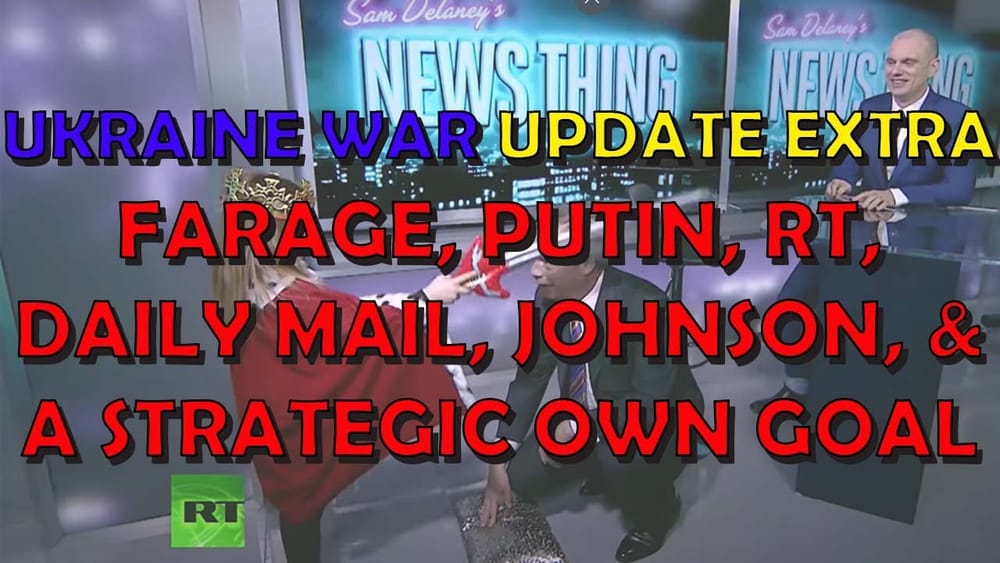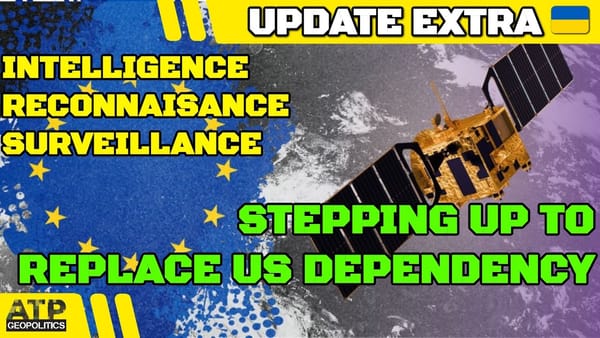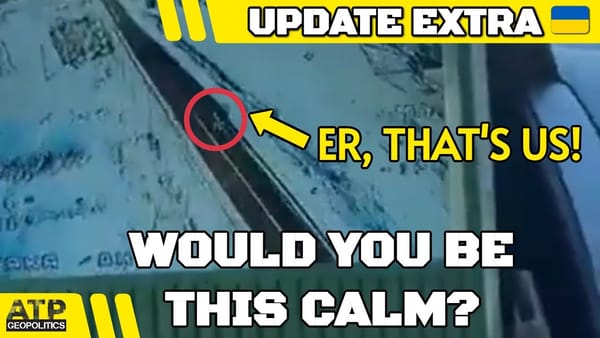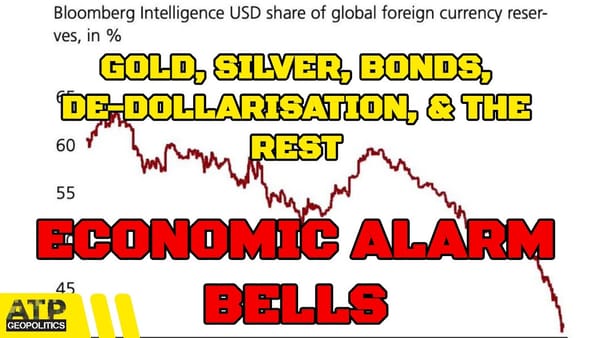Ukraine War Upd. EXTRA: Farage, RT, Putin, Johnson, Daily Mail, & Poor Strategy
Table of Contents 📖
"So the question I've been mulling over the past few days is, is Nigel Farage the flame that the Conservative moths flutter towards? Or is he the moth that flutters towards the Conservative Party? And it's very hard to see either going near each other now as a result of this."
Hello Team
🎦 00:00-00:20⏩
Jonathan welcomes his audience and explains that this is an Extra video and not a regular Ukraine War News Update. He has already covered the topic of Nigel Farage in previous videos but is including this video to purge himself of these ideas and thoughts.
Return to top⤴️
Nigel Farage - Structure of Reform UK
🎦 00:20-01:47⏩
Jonathan begins by outlining the structure of Nigel Farage's Reform UK party, stating that it is not an electoral party but a private company with no internal democracy. Jonathan is critical of this structure as he believes democracy should be at the centre of any political party. Jonathan notes that Reform UK is currently polling at 17% in the UK, which he believes is damaging the Conservatives' chances of winning the upcoming election.
Return to top⤴️
Nigel Farage's 2014 Prediction of War in Ukraine
🎦 01:47-06:58⏩
Jonathan discusses Nigel Farage's claim that he predicted the war in Ukraine in 2014, stating that while this may be true, it is more important to understand the reasons why he made this prediction. Jonathan argues that Farage's explanation, that NATO expansion provoked Putin, is wrong and echoes Putin's propaganda. He points out that the EU and NATO expansion is not about aggression but rather a response to countries seeking to join due to their desire for democracy and freedom. Jonathan reminds his audience that Armenia has recently declared its desire to join the EU, which is not an example of expansionism but rather a country seeking to join its own accord.
Return to top⤴️
Fact Check: Lord Robertson's Comments on EU Expansionism
🎦 06:58-11:53⏩
Jonathan addresses Nigel Farage's claim that Lord Robertson, former NATO Secretary General, supports the idea that EU expansion provoked Putin's invasion of Ukraine. He provides a fact check from the Shropshire Star which states that Lord Robertson never made this comment, and Farage is misrepresenting his views. In fact, Lord Robertson has stated that Putin is not bothered by NATO expansion and that the Ukraine crisis started with the offer of an EU accession agreement to Ukraine in 2014. Jonathan is clear that while this offer may have played a part in the crisis, it is Putin who ultimately bears the responsibility for invading Ukraine.
Return to top⤴️
Farage's Admiration of Putin
🎦 11:53-14:10⏩
Jonathan notes that Farage has previously stated that Putin is the leader he admires most, though he clarifies that this statement was made in a nuanced way. Farage admires Putin's ability to wield power for his own advantage, demonstrating a cynical and non-democratic worldview. Jonathan draws parallels to Trump's admiration of authoritarian leaders like Kim Jong-un, Xi Jinping, and Vladimir Putin.
Return to top⤴️
Farage's Connections to Russia
🎦 14:10-17:08⏩
Jonathan details a series of connections between Farage and Russia, including his paid appearances on Russian state media outlet RT, his reported connections to the Russian ambassador, his ties to Aaron Banks, a funder of the Leave.eu campaign, who himself has been linked to Russian money. Jonathan notes that there have been persistent reports of Russian interference with the Brexit referendum, though these have been suppressed by the Conservative government. He also points out that Farage's views closely mirror those of Steve Bannon and Donald Trump, both of whom have openly supported Russia.
Return to top⤴️
Russian State Media's Praise for Farage
🎦 17:08-18:02⏩
Jonathan notes that Russian state media has praised Nigel Farage for his comments, highlighting that Farage's rhetoric is in line with Russian propaganda. He cites an interview on Times Radio with a former Putin advisor who agreed with Farage's comments on NATO expansionism but criticized his other views. Jonathan emphasizes that Russian state media conveniently ignores the aspects of Farage's claims that are actually true (e.g., that Russia invaded Ukraine).
Return to top⤴️
NATO Expansionism: A Post-Hoc Rationalisation
🎦 18:02-19:54⏩
Jonathan argues that NATO expansionism is not a valid reason for Russia's invasion of Ukraine, highlighting that it was a post-hoc rationalization used by Putin to try and justify his actions. He notes that Putin's own 7000-word essay on the invasion of Ukraine mentioned NATO very little, suggesting that expansionism was not a significant factor in his decision-making. Jonathan argues that Putin's desire to re-establish Russia as a dominant force in the region, and his view of Ukraine as part of Russia's historical sphere of influence, are more plausible explanations for the invasion.
Return to top⤴️
EU Expansionism: Not About Stealing Countries
🎦 19:54-22:57⏩
Jonathan clarifies that EU expansion is not about the EU forcefully taking over countries. He points out that countries like Montenegro have spent years striving for EU membership, highlighting that it is a process that takes time and requires a country's own commitment. He argues that Ukraine's desire to join the EU is driven by its people's aspirations for democracy and freedom, not by EU expansionism.
Return to top⤴️
NATO as a Defensive Pact
🎦 22:57-23:46⏩
Jonathan reiterates that NATO is a defensive pact, not an aggressive force. He stresses that NATO's expansion has been a result of countries choosing to join, not of NATO forcing them to do so. He uses the example of countries leaving the Warsaw Pact in 1991 and joining NATO voluntarily to demonstrate that NATO does not engage in expansionism. He criticizes Farage's attempt to portray NATO as an expansionist threat to Russia.
Return to top⤴️
Farage's Pro-Russian Position
🎦 23:46-26:15⏩
Jonathan argues that Farage's pro-Russian stance is not a genuine attempt to understand the complex issues surrounding the Ukraine war but rather a deliberate attempt to shift blame away from Russia and towards NATO and the EU. He explains that Farage is trying to appeal to the same sentiment found in the American MAGA movement, which seeks to minimize US involvement in foreign wars. However, Jonathan believes that this strategy is unlikely to be successful in the UK due to the public's strong support for Ukraine and the recent Russian aggression in Salisbury.
Return to top⤴️
Salisbury's Experience of Russian Aggression
🎦 26:15-30:11⏩
Jonathan discusses the poisoning of Sergei Skripal in Salisbury in 2018, highlighting the city's firsthand experience of Russian aggression. He emphasizes that Salisbury's residents are unlikely to be receptive to pro-Russian narratives. He cites an example of a Reform UK candidate in Salisbury who was booed for stating that Putin "seemed very good". Jonathan points out that the candidate's comment reflects a Russian appeasement policy, which he argues is dangerous and misguided.
Return to top⤴️
Farage's Poor Strategizing
🎦 30:11-33:51⏩
Jonathan contends that Farage's pro-Russian stance is a strategic blunder, arguing that it will alienate a significant portion of the British electorate, particularly those who have been directly affected by Russian aggression, and those who support the UK's military involvement in training Ukrainian troops. He notes that Farage's views have been rejected by both the Daily Mail and Boris Johnson, who has been a strong supporter of Ukraine. Jonathan believes that Farage's attempt to portray the war in Ukraine as a stalemate is a dangerous and misguided approach.
Return to top⤴️
The Future of Conservatism
🎦 33:51-46:16⏩
Jonathan discusses the broader implications of Farage's pro-Russian stance for the future of conservatism in the UK, noting that his views have challenged the consensus across the political spectrum, which has generally supported unequivocal British support for Ukraine. He highlights that Farage is the only major political figure who has suggested that the war in Ukraine is at a stalemate. Jonathan argues that this stance will likely alienate even those who might be sympathetic to Farage's populist views on immigration and other issues. He also highlights a conversation between Aaron Bastani and Peter Oborn, which explores the tension between the new populism and old school conservatism, particularly within the context of the Conservative Party's embrace of populist rhetoric on immigration and other issues.
Return to top⤴️
The Conservative Party's Dilemma
🎦 46:16-51:51⏩
Jonathan observes that the Conservative Party finds itself in a difficult situation, with Farage's emergence threatening to split the party's right wing. He notes that the Daily Mail, a long-time supporter of Farage, is now questioning its loyalty to him due to his pro-Putin stance, highlighting that the Conservative Party's right wing may be divided between supporting the Conservative Party and supporting Farage's Reform UK. Jonathan concludes that the Conservative Party is facing a significant crisis, with Farage's emergence as a potent force on the right.
Return to top⤴️
Boris Johnson's Hypocrisy
🎦 51:51-54:53⏩
Jonathan highlights Boris Johnson's hypocrisy, noting that he has previously echoed Farage's rhetoric on the Ukraine crisis, suggesting that the EU's role in the conflict was a provocation. Jonathan points out that Johnson's current stance on the war is a stark contrast to his previous views, and that he allowed Russian oligarchs to donate to the Conservative Party. He also notes that Johnson appointed Evgeny Lebedev, son of a former KGB agent, to the House of Lords. He concludes that Johnson's claims of being a strong supporter of Ukraine are undermined by his previous actions and connections to Russia.
Return to top⤴️
The Perfect Storm for Keir Starmer
🎦 54:53-56:31⏩
Jonathan argues that the current situation in British politics presents a perfect opportunity for Labour leader Keir Starmer, as the Conservative Party is embroiled in scandal, with the right wing of the party divided between the Conservatives and Farage's Reform UK. He points out that the Conservatives' focus on internal struggles and scandals allows Starmer to present himself as a more competent and stable alternative, with a clear vision for the future.
Return to top⤴️
Wrap up
🎦 56:31-56:46⏩
Jonathan ends the video by summarizing his thoughts on the situation and encourages his viewers to share their opinions. He signs off with a final farewell.
Return to top⤴️




